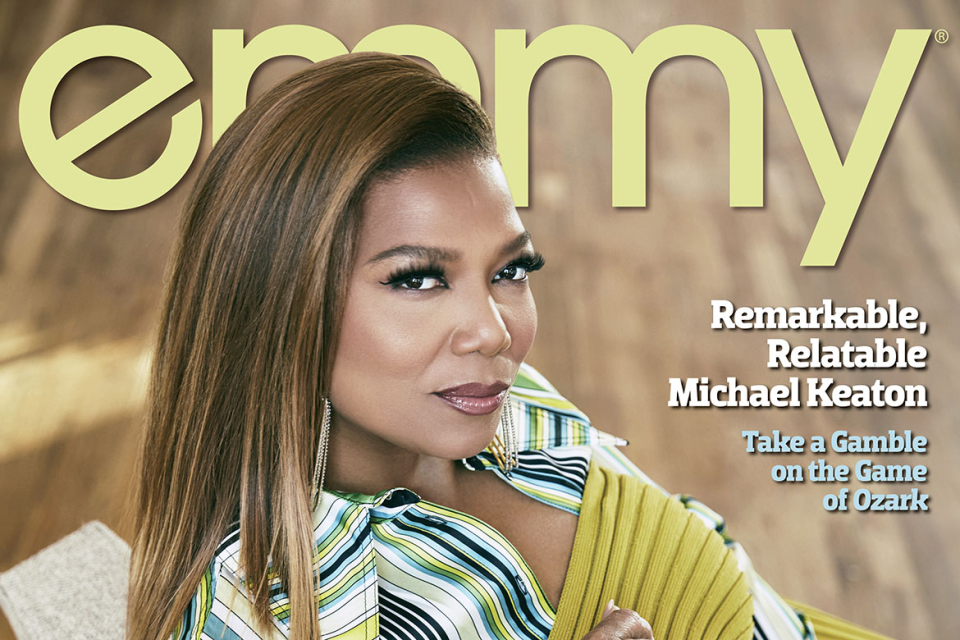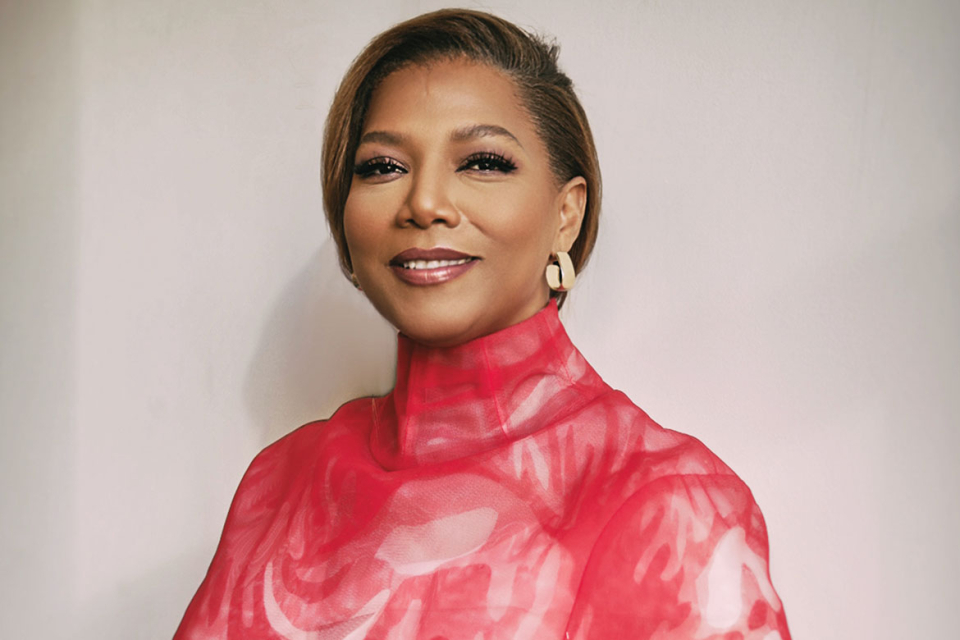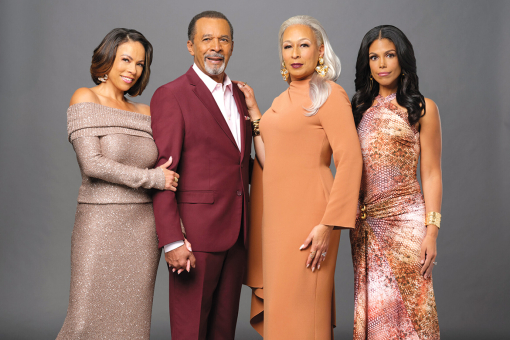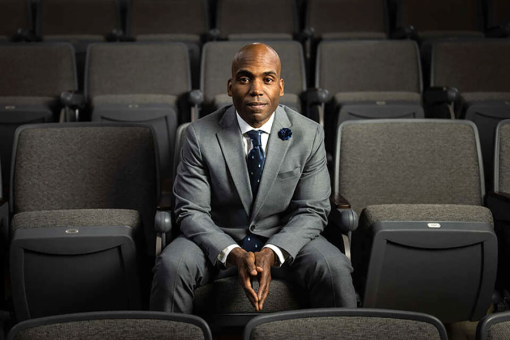Let's get this out of the way right at the top. In most celebrity profiles, a handful of people who've worked with said celeb talk about what a generous, thoughtful person he or she is. This happens so frequently, you'd be forgiven for assuming that people say those things because it's, well, just what people are supposed to say in celebrity profiles.
Not in this case. I worked as a producer on Queen Latifah's syndicated daytime talk show, which aired from 2013 until 2015. I have firsthand knowledge that she is indeed the generous, thoughtful person described in stories like this. For instance, there was that time she stopped on her way home from the studio to let my young daughter sit in her car for thirty minutes so they could talk about The Flash, a show they both enjoyed. There were the frequent chats we'd have about our musical tastes, which ranged from Shirley Temple to De La Soul to Metallica. And I'll never forget our wrap party, during which she noticed I danced with all the rhythm of one of those floppy balloon guys at car dealerships and tried to teach me a few moves.
In other words, Queen Latifah is exactly who you want Queen Latifah to be.
Read this article in the digital edition of emmy.
"Everybody needs somebody to pat them on the back or give them a hug and say, 'It's okay. You're good. You're perfect being who you are.' You know what I mean?" she says as I reminisce about our time together while interviewing her for this story. "I'm happy to be the one to give somebody a hug. I've always been a big hugger. And I compliment people. A compliment goes a long way sometimes. Just saying, 'Oh, that's a nice shirt you're wearing!' Somebody might have really needed to hear that that day. You just have no idea."
This attitude is why, when her close friend Jada Pinkett Smith explains that Queen Latifah "has one of the most tender hearts I know" or Common, with whom she costarred in the 2010 film Just Wright, says that she is "always going to glow and get better, plus when you wrap a project, she's going to buy you some incredible pizzas," it's safe to believe the hype.
When Lorraine Toussaint, a costar on Queen Latifah's hit series The Equalizer, says the star offered a camera operator her motorcycle after learning he'd wrecked his, rest assured it's all in her day's work. And when castmates rave about how Queen Latifah regularly raises their spirits during downtime on Equalizer's New York City set by blasting tunes, trust that her exuberance and energy are very real and very inspiring.
Considering her résumé, Queen Latifah can bring her trademark enthusiasm to pretty much any project in any genre:
She conquered the music world in the late '80s and early '90s as one of hip-hop's primary female pioneers.
She's a bankable movie star thanks to hit films like Set It Off (1996) and Girls Trip (2017), along with her Oscar-nominated turn as Mama Morton in the 2002 film version of Chicago.
And she's been a fixture on television ever since her Fox sitcom Living Single took off in the mid-'90s. She won an Emmy as an executive producer of the 2015 HBO movie Bessie, and her starring role in the film — as blues legend Bessie Smith — also was Emmy-nommed. She's earned two other nominations: for her lead role in the 2007 HBO film Life Support and as an executive producer for the 2017 Lifetime movie Flint.
So, starring in CBS's reboot of a 1980s action series was not an obvious next move. The Equalizer had already been revived as a pair of Denzel Washington movies, then laid to rest again. Yet Queen Latifah was so eager to dive in that she agreed to do it the first time it was pitched to her.
Executive producer Debra Martin Chase, who'd previously worked with Queen Latifah on Just Wright, reached out to set up a meeting about future projects right after Queen Latifah's Fox drama, Star, was canceled in 2019. The Equalizer reboot, Chase explains, needed a woman as the central character but "required a certain type of woman — someone who is tough and believable with the action, but whose heart and vulnerability you believe, too."
For Queen Latifah, the description was like looking in a mirror.
"The 'yes' was out of my mouth before I could even think about what I was saying or signing up for," she says. "The whole idea of The Equalizer was very tantalizing to me. Being a fan of the original show as well as the films, I was like, 'Hell, yeah!' I'll say yes, and then I'll let the powers that be work out all the other stuff. Then we'll start getting creative about it."
Creativity was a necessity. The original '80s series starred white Englishman Edward Woodward as retired covert-ops agent Robert McCall, who took it upon himself to give people battling bad guys a fighting chance. That's why Queen Latifah knew her character — Robyn McCall — had to establish a different and more timely tone. Today's McCall lives with her aunt (Toussaint) and teenage daughter (Laya DeLeon Hayes) while applying the skills she learned in the intelligence trade to help the downtrodden, often with assistance from covert crimefighter friends (Adam Goldberg, Liza Lapira) and a kindred-spirit cop (Tory Kittles).
This new approach would hook viewers, Queen Latifah reasoned, because, "It's a woman at the helm, a Black woman at that, who is also a mother. She's trying to balance working and being a parent. What makes the show so important is that they can relate to what we're doing."
Beyond work-life balance, the series has tackled topical social issues, such as Asian hate, corrupt cops and immigration. "It was always intended to be a 'ripped from the headlines' show," Queen Latifah says. "If it was up to me, we'd go even further than we do. Some of these issues are very tough, but very realistic to our times."
Add relatability and reality to all the action scenes — with McCall indulging in activities Queen Latifah herself loves, like martial arts and riding motorcycles — and she figured viewers would flock to the show. After all, who doesn't enjoy, as she puts it, watching "a badass woman kick ass"? And to make sure she accurately portrayed McCall's tough tactics for delivering justice, Queen Latifah sought help from people she knows well.
"I did call a couple of relatives who sort of do what she does [law enforcement]. These waters run a little deep in my family," she says, noting that her dad, Lancelot Owens, used to work for the Newark, New Jersey, police department. "I needed to make this character make sense, and I wanted to know what kind of pressures people like her face. I wanted to know what it was like to have a family while you're going out there in the world to exact justice, even possibly killing someone."
Turning to family for support is nothing new for Queen Latifah, who was born Dana Owens and grew up in East Orange, New Jersey, along with dad Lancelot, mom Rita and older brother Lancelot. Her parents nudged both kids toward the arts — drawing, painting and writing. Rita was a schoolteacher, so education was a priority.
"We'd hang out as kids and read the New York Times and the Newark Star-Ledger and get excited about being able to read what we called seventy-five-cent words, which were like five- or six- syllable words," Queen Latifah says. "At the table at dinner, we'd talk about various subjects. My parents were very communicative and language, thought, philosophy... all of that was encouraged in our house."
The Owens home was filled with music, thanks in part to young Dana's guitar lessons and love of singing in church. She'd grown fond of inspirational poems by Helen Steiner Rice, which she discovered on greeting cards and used as inspiration for original poetry she would eventually set to music. When not making music or playing board games such as chess, she'd unwind with her brother by watching reruns of their favorite series, Star Trek, and trying out their William Shatner impersonations.
At the time, she aspired to two very different careers — marine biologist and truck driver. The former stemmed from her love of Jacques Cousteau's TV specials, while the latter was inspired by a TV commercial that promised lots of money and travel to anyone driving a big rig. It was clear early on that she was a born performer, something her family encouraged. Another influencer was a deepvoiced British actress who declared in a series of well-known haircare commercials, "I'm Rula Lenska."
"I could imitate her when I was young, and I remember my aunt saying, 'Dana! Dana! Come in here! Come and do the commercial!'" Queen Latifah recalls. "So I'd say to everyone, in that voice, I'm Rula Lenska."
It was her first big performance. After that, there was no stopping her. Around that time, she adopted the nickname Latifah, Arabic for "delicate and sensitive." By high school, she was singing and acting in school plays. During a production of Godspell, she was one of several characters carrying the body of Jesus Christ past the audience in the school gym, and that moment changed her life.
"My whole family came to watch — my aunt and uncle, my mom and dad, my older cousins — and I remember walking down the aisle carrying this boy's body and I was crying," she says. "I was so into the performance that I cried. I'll never forget the look on the faces of my aunt and uncle... they were right there with me. That's when I realized how transformative performing could be, how you could literally take someone on a journey with you and have them feel what you're feeling — if you also feel it and show it."
Besides Queen Latifah and Debra Martin Chase, the executive producers of The Equalizer include showrunners Andrew W. Marlowe and Terri Edda Miller, plus John Davis, John Fox, Shakim Compere, Richard Lindheim and Joseph C. Wilson. The series is produced by Universal Television, a division of Universal Studio Group, in association with CBS Studios. Catch-up viewing is available on Paramount+.
To read the rest of the story, pick up a copy of emmy magazine HERE.
This article originally appeared in its entirety in emmy magazine, Issue No. 4, under the title, "The Blessings of Yes."












